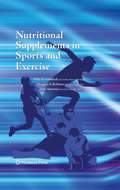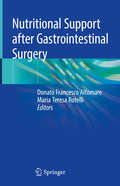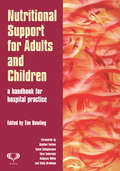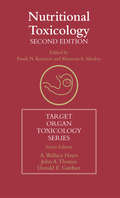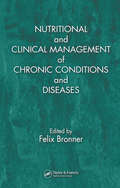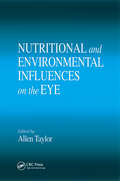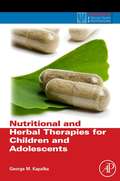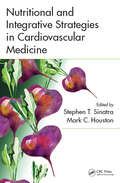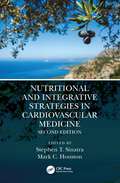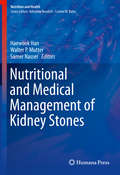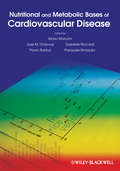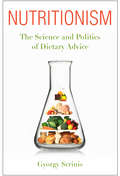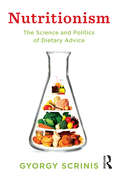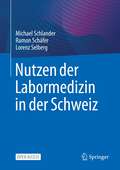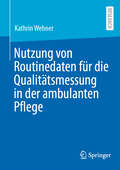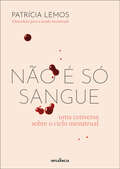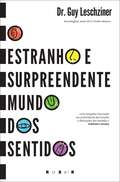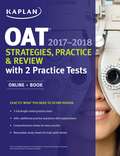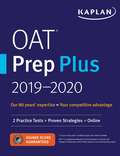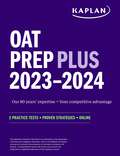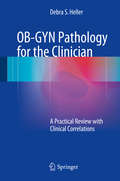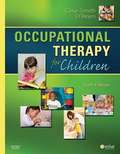- Table View
- List View
Nutritional Supplements in Sports and Exercise
by Mike Greenwood Jose Antonio Douglas KalmanIn the ever-growing field of sports nutrition and nutritional supplementation, it is imperative to have a comprehensive and extensive guide, which is exactly what Nutritional Supplements in Sports and Exercise provides. The editors and authors have skillfully structured their research and findings as they deliver an accessible wealth of knowledge to the general population, while also maintaining academic and professional integrity through quality based and advanced scientific research, which renders it useful in the professional environment by sports nutritionists, exercise physiologists, strength and conditioning/personal trainers, athletic trainers, registered dietitians, college/ professional sports affiliates, and academic programs. Not only does Nutritional Supplements in Sports and Exercise significantly cover the physical aspects of supplement usage, but it also expands its breadth as it notes the psychological effects upon users and discusses its various governmental regulations, and attempts to understand the future of nutritional supplements as the industry continues its likely growth. Nutritional Supplements in Sports and Exercise covers a timely subject, and offers interested readers knowledgeable insight into a rising industry plagued by concerns and question.
Nutritional Support after Gastrointestinal Surgery
by Donato Francesco Altomare Maria Teresa RotelliThis volume provides readers with the necessary information to select the most appropriate nutritional support following gastrointestinal tract surgery.Most patients are worried about resuming oral intake, particularly when the surgery has altered the GI tract normal physiology removing organs (e.g. total colectomy) or part of them, or modifying the natural sequence of the different GI tract parts (e.g. after esophagectomy or pancreatectomy). Patients may also worry about the possible complications of an inappropriate alimentation. As a matter of fact, several metabolic processes can be modified by GI tract surgery (e.g. major liver resection or pancreatectomy), thus making the nutritional support essential: and the same support is fundamental in bariatric surgery, nowadays widely used for super-obese patients. There is therefore a need for a nutritional guide in surgery and in troubleshooting postoperative cases where nutrition is a major issue This book offers nutritionists insights into the possible alterations of GI tract physiology occurring after surgery, and will be a valuable resource for surgeons, gastroenterologists, coloproctologists, nutritionists and clinical specialist nurses, seeking guidance on postoperative nutrition.
Nutritional Support for Adults and Children: A Handbook for Hospital Practice
by Tim Bowling‘This book effectively bridges the gap between dietitian, doctor, nurse and pharmacist and there is much in it to educate even the more experienced practitioner. I recommend the book highly and feel confident that well-thumbed and battered copies will soon be found on wards everywhere.’ Alastair Forbes, Chairman of the British Association of Parenteral and Enteral Nutrition ‘This book will help non-specialists to make appropriate choices regarding nutritional care for their patients. It should prove to be a valuable resource for all professions, in many areas of practice.’ Lynne Colagiovanni, Chairman, National Nurses Nutrition Group ‘This is a much needed comprehensive clinical nutrition guide for busy healthcare professionals. It covers all aspects of nutritional care in a logical and systematic way and will aid clinicians in making reasoned judgments on the nutritional care that their patients require.’ Vera Todorovic, The Parenteral and Enteral Nutrition Group of the British Dietetic Association ‘This handbook will be an invaluable resource, as it provides a concise, practical guide covering all aspects of clinical nutrition, both for adults and paediatric patients.’ Rebecca White and Vicky Bradnam, British Pharmaceutical Nutrition Group
Nutritional Toxicology
by Frank N. Kotsonis Maureen A. MackeyNutrients are gaining recognition for their role in protecting against the toxic effects of free radicals, alcohol and other substances. At the same time, advances in food technology, the appearance of novel foods and new ingredients have generated new toxicological issues and forced health and safety professionals to develop new and more reliable
Nutritional Toxicology
by Lishi ZhangThis book provides a broad overview of the chemicals in food that have the potential to induce adverse health effects. Nutritional Toxicology is an interaction of nutrition, toxicology, biochemistry and food science, etc. Its main research scope involves the effects of nutrients on metabolisms of toxicants and their mechanisms, the interaction of the toxicants and contaminants originated from diet with nutrients and nutrition process, the adverse health outcome of nutrients excess, as well as methodology of research and related food and nutrition regulation process. Also the risk assessment of toxicants and contaminants in foods, and risk benefit assessment of nutrients (dietary supplementation) has become an emerging topic. This book provides novel and provocative insights into the fields of nutrition, food science and toxicology. It also offers a state-of-the-art report on recent discoveries concerning nutritional toxicology and where the field is going. It mainly focuses on advances made over the past 20 years. It will benefit graduate students, researchers and food and nutrition related regulation parties.
Nutritional and Clinical Management of Chronic Conditions and Diseases
by Felix BronnerNutritional status is recognized as a major determinant in health and disease. Effective treatment of chronic conditions such as obesity or of diseases of the skin requires the integration of clinical and nutritional management. Nutritional and Clinical Management of Chronic Conditions and Diseases, like its predecessor, Nutritional Aspects and Cli
Nutritional and Environmental Influences on the Eye (Modern Nutrition Ser.)
by Allen TaylorSignificant advancements in nutrition's impact on the eye have occurred faster than any volume can document... until now. This book gives the background and rationale regarding the physiological damage caused by biological oxidants as well as the rationale for the protective roles for nutrient-antioxidants and how they affect the risk for cataracts. This volume also contains information on how to quantitatively assess age-related diseases of the eye including cataracts and age-related maculopathy. Smoking and light exposure as factors for age-related eye diseases as well as the utility of potential anticataract pharmaceuticals is discussed.
Nutritional and Herbal Therapies for Children and Adolescents: A Handbook for Mental Health Clinicians
by George M. KapalkaThis volume assists practicing mental health professionals in expanding their knowledge about nutritional and herbal interventions that can be attempted as alternatives to prescription medications. Designed to provide guidance for non-medical caregivers treating children and adolescents who present with emotional and/or behavioral difficulties such as such as depression, anxiety, ADHD, sleep difficulties, impulsivity, distractibility, and other psychological and psychiatric disorders, the volume provides a comprehensive discussion of naturopathic solutions based on existing research.
Nutritional and Integrative Strategies in Cardiovascular Medicine
by Stephen T. Sinatra Mark C. HoustonDespite 40 years of aggressive pharmaceutical and surgical interventions, coronary artery disease (CAD) remains the number one killer of women and men in Western civilization. When it comes to CAD, prevention is easier than cure, and if CAD does present itself, a combination of conventional and alternative methodologies can truly make a difference
Nutritional and Integrative Strategies in Cardiovascular Medicine
by Stephen T. SinatraBuilding upon its predecessor, this new edition provides an in-depth review of the role of nutrition on cardiovascular health and disease. It provides scientific and clinical insight from leaders in the field of cardiovascular medicine who explore an integrative approach to treating and curing cardiovascular diseases through conventional and non allopathic methodologies. This evidence-based book describes how to integrate nutrition, supplements, lifestyle changes, and medications for improved outcomes in several diseases and conditions including hypertension, diabetes mellitus, metabolic syndrome, and obesity.
Nutritional and Medical Management of Kidney Stones (Nutrition and Health)
by Haewook Han Walter P. Mutter Samer NasserThis text comprehensively covers the nutritional and medical management and prevention of kidney stones. Sections address types of stones, nutritional risks, medical and pharmaceutical managements, prevention of recurrence, and special consideration of stone risks among specific diseases such as obesity with gastric bypass, chronic kidney disease, and gastric intestinal disorders. Diagnosis of kidney stones, urinalysis and biochemical indices, dietary assessment, and medical nutrition therapy for specific types of kidney stones are also included. In addition, case studies are provided in the appendix. Cutting edge research is also highlighted in regards to pharmaceutical treatments and epidemiological findings in nutrition and kidney stones. Nutrition in Medical Management of Kidney Stones will be a practical resource for health professionals in the fields of nutrition, nephrology, urology, and general medicine, as well as medical students, resident physicians, and allied health clinicians whose research, practice, and education includes nutrition and kidney stones.
Nutritional and Metabolic Bases of Cardiovascular Disease
by Pasquale Strazzullo Paolo Rubba Mario Mancini José M. Ordovas Gabriele RiccardiExtraordinary advances in the understanding of the links between nutrition, metabolism, and cardiovascular disease have prompted a systematic reappraisal of knowledge in the field. As a result, it is now imperative that clinicians who care for patients with CVD or its key risk factors have a solid understanding of the often complex interrelationships between cardiovascular health and chronic diseases such as diabetes and obesity. Written by a team of international thought leaders in cardiology, endocrinology, diabetology and nutritional science, this important new book: Examines and updates the role of obesity, hyperlipidemia, diabetes, hypertension, thrombosis, and aging in atherogenesis Describes in detail the scientific and clinical evidence of the etiopathogenesis of ischemic heart disease as well as of peripheral and cerebrovascular disease Focuses on the 6 topics that will be of greatest interest to readers: 1) general nutrition, 2) metabolic syndrome and diabetes, 3) hyperlipidemia and atherosclerosis, 4) hypertension and cerebrovascular disease, 5) hemostasis and thrombosis, 6) aging Throughout the book, in clear and accessible text, contributors illuminate the close relationship between dietary habits, the metabolic processes of nutrients, and their impact on the cardiovascular system, always with an eye on how the physician can use this information to implement better cardiovascular prevention and improve patient care. Nutritional and Metabolic Bases of Cardiovascular Disease is ideal for those who need to update their knowledge of the links between nutrition, metabolism and CVD, from trainees, clinicians and clinical investigators in cardiovascular medicine to endocrinologists, diabetologists, and nutritionists.
Nutritional and Physiological Functions of Amino Acids in Pigs
by Francois Blachier Guoyao Wu Yulong YinThis book provides developmental data regarding piglets (with a focus on the gastrointestinal tract), data related to amino acid metabolism in pigs, data related to nutritional and physiological functions of amino acids in pigs, nutritional requirements for amino acids in pigs, signaling roles of amino acids, methodological aspects in amino acid research and the pig model for studying amino acid-related human diseases.
Nutritionism: The Science and Politics of Dietary Advice (Arts and Traditions of the Table: Perspectives on Culinary History)
by Gyorgy ScrinisPopularized by Michael Pollan in his best-selling In Defense of Food, Gyorgy Scrinis's concept of nutritionism refers to the reductive understanding of nutrients as the key indicators of healthy food—an approach that has dominated nutrition science, dietary advice, and food marketing. Scrinis argues this ideology has narrowed and in some cases distorted our appreciation of food quality, such that even highly processed foods may be perceived as healthful depending on their content of "good" or "bad" nutrients. Investigating the butter versus margarine debate, the battle between low-fat, low-carb, and other weight-loss diets, and the food industry's strategic promotion of nutritionally enhanced foods, Scrinis reveals the scientific, social, and economic factors driving our modern fascination with nutrition.Scrinis develops an original framework and terminology for analyzing the characteristics and consequences of nutritionism since the late nineteenth century. He begins with the era of quantification, in which the idea of protective nutrients, caloric reductionism, and vitamins' curative effects took shape. He follows with the era of good and bad nutritionism, which set nutricentric dietary guidelines and defined the parameters of unhealthy nutrients; and concludes with our current era of functional nutritionism, in which the focus has shifted to targeted nutrients, superfoods, and optimal diets. Scrinis's research underscores the critical role of nutrition science and dietary advice in shaping our relationship to food and our bodies and in heightening our nutritional anxieties. He ultimately shows how nutritionism has aligned the demands and perceived needs of consumers with the commercial interests of food manufacturers and corporations. Scrinis also offers an alternative paradigm for assessing the healthfulness of foods—the food quality paradigm—that privileges food production and processing quality, cultural-traditional knowledge, and sensual-practical experience, and promotes less reductive forms of nutrition research and dietary advice.
Nutritionism: The science and politics of dietary advice (Arts And Traditions Of The Table: Perspectives On Culinary History Ser.)
by Gyorgy Scrinis'Gyorgy Scrinis exposes the folly of the reductionist approach and proposes an alternative food quality paradigm, based on respecting traditional dietary patterns and reducing technological processing. It may offend nutritionists and will upset the food industry, but it could also herald a delicious revolution in our ability to eat well.' - Dr Rosemary Stanton OAM, NutritionistFrom the fear of 'bad nutrients' such as fat and cholesterol, to the celebration of supposedly health-enhancing vitamins and omega-3 fats, our understanding of food and health has been dominated by a reductive scientific focus on nutrients. It is on this basis that butter and eggs have been vilified, yet highly processed foods such as margarine have been promoted as being healthier than whole foods.Gyorgy Scrinis argues that this ideology of nutritionism has narrowed and distorted our appreciation of food quality, while promoting nutrition confusion and nutritional anxieties. The food industry exploits these anxieties by nutritionally modifying their food products, and marketing them with nutritional and health claims.Through a fascinating investigation into such issues as the butter versus margarine debate, the battle between low-fat, low-carb, low-calorie and low-GI weight-loss diets, the limitations of dietary guidelines, and the search for the optimal dietary pattern - from Mediterranean and vegetarian to paleo diets - Scrinis builds a revealing history of the scientific, social, and economic factors driving our modern fascination with nutrition, and explores alternative ways of understanding food quality.
Nutzen der Labormedizin in der Schweiz
by Michael Schlander Ramon Schäfer Lorenz SelbergDie Labormedizin gilt nach Expertenmeinung als ausschlaggebend für rund 70 % aller klinischen Entscheide, wird jedoch hinsichtlich ihrer Kosten und des Kosten-Nutzen-Verhältnisses labordiagnostischer Verfahren kritisch betrachtet. Mit diesem Buch veröffentlicht das Institut für Innovation & Evaluation im Gesundheitswesen eine von der schweizerischen Foederatio Analyticorum Medicinalium Helveticorum (FAMH) veranlassten Studie, um den gegenwärtig generierten und zukünftig zu erwartenden Nutzen von Laboranalysen aus der Perspektive von Patienten und Gesellschaft zu untersuchen. Dies ist ein Open-Access-Buch.
Nutzung von Routinedaten für die Qualitätsmessung in der ambulanten Pflege
by Kathrin WehnerIn der eigenen Häuslichkeit versorgt zu werden, ist für viele pflegebedürftige Menschen von großer Bedeutung. Neben Angehörigen gewährleisten ambulante Pflegedienste die häusliche Versorgung. In Deutschland wird ein Viertel der zu Hause betreuten pflegebedürftigen Menschen von ambulanten Pflegediensten versorgt. Das Thema der Qualität der ambulanten Pflege ist zunehmend Gegenstand pflegefachlicher und politischer Diskussionen. Eine Möglichkeit zur Messung von Versorgungsqualität ist die Nutzung von Routinedaten von Kranken- bzw. Pflegekassen. Für die ambulante Pflege gab es hierzu bislang keine Überlegungen. Im Rahmen der Forschungsarbeit wurde daher die generelle Nutzbarkeit von Routinedaten für die ambulante Pflege untersucht. Im Ergebnis zeigt sich, dass eine Reihe von qualitätsrelevanten Versorgungsaspekten in der ambulanten Pflege anhand von Routinedaten operationalisierbar ist. Die Mehrzahl der relevanten Versorgungsaspekte ist jedoch nicht über Routinedaten abbildbar. Hierfür wären unter anderem grundlegende Anpassungen der gesetzlichen Rahmenbedingungen erforderlich.
Não É Só Sangue: Uma Conversa Sobre o Ciclo Menstrual
by Patrícia LemosO ciclo menstrual é reflexo da sua saúde. Aprenda o que o seu corpo lhe está a querer dizer. Além das questões menstruais, o livro ajudará as mulheres a compreender o importante conceito de literacia de corpo: que se traduz na capacidade de interpretarmos os sinais que o corpo nos dá e capacitar-nos no sentido de nos permitir tornarmo-nos uma autoridade nos nossos próprios assuntos. Porque é que precisa de um livro sobre ciclo menstrual? O mais provável é que seja diferente do que aquilo que lhe contaram. Para algumas pessoas, a menstruação é a chatice que aparece de quando em vez; para outras, não incomoda assim tanto. Mas para todas as pessoas que menstruam: o ciclo menstrual é informação. Patrícia Lemos, educadora para a saúde menstrual e fertilidade, ajuda-nos a compreender o nosso ciclo menstrual e a olhá-lo como um indicador de saúde, sempre — e não apenas quando se pensa em ter bebés. Neste livro, descobrirá que:· No ciclo menstrual, o mais importante é invisível aos olhos. · Ovular faz-nos falta, mesmo quando não queremos engravidar. · A expressão do período (cor, consistência, cheiro, duração) fornece pistas sobre a nossa saúde.· Num pico de fertilidade, as probabilidades de conceção são de cerca de 20% a 25% a cada ciclo. · A TPM tem tratamento, e não é suposto existir. · A síndrome dos ovários poliquísticos é uma condição crónica, não se cura com a pílula e não se diagnostica apenas com uma ecografia.· A endometriose é uma condição de saúde séria e estrogénio-dependente. · Infertilidade e subfertilidade são coisas distintas.
O Completo guia do ÓLEO CBD para o ALÍVIO DAS DORES
by Sandra Moore Eliane CarvalhoO Completo guia do ÓLEO CBD para o ALÍVIO DAS DORES: Um guia com o passo a passo para iniciantes com informações a respeito do ÓLEO de CANABIDIOL para o tratamento natural e eficaz para diversos males. VOCÊ ESTÁ SOFRENDO COM DORES CRÔNICAS, ARTRITE REUMATOIDE, FIBROMIALGIA, ESCLEROSE MÚLTIPLA, DORES NA COSTAS E NO PESCOÇO, ANSIEDADE E DEPRESSÃO, OU OUTRAS DOENÇAS QUE O IMPEDEM DE VIVER SAUDÁVEL E FELIZ? Em caso afirmativo: provavelmente você está tomando medicamentos como o ibuprofeno para ajudá-lo no alívio das dores, mas com os terríveis efeitos colaterais desses medicamentos a sua saúde piora a cada dia. Você não precisa sofrer com isso! Com os benefícios do CANABIDIOL ÓLEO que foi pesquisado, testado e comprovado pelos cientistas, você conhecerá os incríveis resultados nos processos de: inflamações, dores crônica, combate a depressão, ansiedade e melhoria na qualidade de vida. Este livro:" O completo guia do óleo CBD para ALÍVIO DAS DORES." Um guia com o passo a passo para iniciantes, com informações a respeito do ÓLEO de CANABIDIOL para o tratamento natural e eficaz de diversos males, alívio de dores sem o uso de medicamentos. O melhor guia sobre o óleo CBD, com informações detalhadas sobre como fazer uso do CANABIDIOL, acompanhado de um guia explicativo para a compra do óleo de CBD de forma precisa sem desperdiçar recursos, e também as pesquisas comprovadas e os testemunhos de usuários do CDB para várias condições de saúde e muito mais. Tudo o que você precisa saber para superar as dores está aqui, não coloque sua vida em risco com medicamentos! Abrace esta maravilha, o ÓLEO natural que pode ser a cura para diversos males. O óleo de CBD é a resposta! Não perca tempo, clique no botão "Comprar" adquira já!
O Estranho e Surpreendente Mundo dos Sentidos
by Guy LeschzinerCOMO OS SENTIDOS MOLDAM A NOSSA PERCEÇÃO DO MUNDO Os nossos sentidos são vitais para a compreensão de tudo o que nos rodeia. Eles enriquecem as nossas experiências de vida e são parte integrante das nossas memórias. No entanto, são falíveis e inconsistentes, vulneráveis a diferenças entre indivíduos e a doenças, pelo que aquilo que consideramos ser real não é mais do que uma reconstrução complexa, uma realidade virtual criada pelo nosso cérebro. A verdade é que os nossos sentidos podem trair-nos, oferecendo-nos a sua própria interpretação do que podemos ver, ouvir, cheirar, tocar ou sentir. Neste livro, o Dr. Guy Leschziner, um conceituado neurologista, apresenta-nos histórias reais e extraordinárias de pessoas cujos sentidos foram alterados de alguma forma, com consequências inesperadas e por vezes devastadoras: pessoas a quem as palavras ativam as papilas gustativas, produzindo um verdadeiro sabor; pessoas cegas que têm uma visão pormenorizada e vívida; pessoas para quem as sensações de quente e frio se invertem. Estes relatos surpreendentes demonstram as limitações dos sentidos, a sua dependência do bom funcionamento do nosso sistema nervoso e, mais importante, o modo como a perceção do mundo pode ser bastante diferente da realidade para cada um de nós. «Um mergulho fascinante nas profundezas das funções e disfunções dos sentidos.» Publishers Weekly «Um livro profundamente comovente e poderoso, repleto de ideias provocadoras sobre a perceção humana e a forma como construímos a realidade.» DANIEL M. DAVIS, autor de O Incrível Sistema Imunitário «Um livro intenso, divertido e excecional. O professor Leschziner conduz-nos numa viagem de exploração dos nossos sentidos, fazendo-nos questionar a natureza da nossa realidade e a forma como interpretamos o mundo que nos rodeia.» Dr. Alistair Stanhouse, psiquiatra e autor de Head First «Através de histórias vívidas de doenças que afetam os nossos sentidos, o professor Leschziner faz uma análise profunda da imensidão de experiências sensoriais presentes em todos os momentos das nossas vidas, mas de que quase não estamos conscientes. Uma fantástica abordagem da neurociência à compreensão dos sentidos.» Allan Ropper, autor bestseller internacional «Fiquei encantada desde o primeiro parágrafo. Através de histórias reais sobre o que acontece quando a nossa frágil perceção do mundo que nos rodeia é afetada, o Dr. Guy Leschziner liga-nos de novo aos nossos sentidos.» Professora Alice Roberts, autora, anatomista e antropóloga
OAT 2017-2018 Strategies, Practice & Review with 2 Practice Tests: Online + Book
by KaplanWith Kaplan's OAT 2017-2018 Strategies, Practice & Review, you will gain an advantage by earning a higher Optometry Admissions Test score - guaranteed or your money back. Updated for the latest test changes, this book includes all of the content and strategies you need to get the OAT results you want, including: * 2 full-length, online practice tests * 600+ practice questions * A guide to the current OAT Blueprint so you know exactly what to expect on Test Day * Kaplan's proven strategies for Test Day success * Comprehensive review of all of the content covered on the OAT: Biology, General Chemistry, Organic Chemistry, Reading Comprehension, Physics, and Quantitative Reasoning * 16-page, tear-out, full-color study sheets for quick review on the go * Practice questions for every subject with answers and explanations Kaplan also offers a wide variety of additional OAT preparation including online programs, books and software, classroom courses, and one-on-one tutoring. For more information about live events, courses, and other materials, visit KaplanOAT.com.
OAT Prep Plus 2019-2020: 2 Practice Tests + Proven Strategies + Online (Kaplan Test Prep)
by Kaplan Test PrepKaplan's OAT Prep Plus 2019-2020 provides the test-taking strategies, realistic practice, and expert guidance you need to get the OAT results you want. Our comprehensive updated subject review reflects recent changes to the blueprint of the exam, question types, and test interface. You'll get two full-length practice OATs and expert tips to help you face Test Day with confidence.The Best ReviewTwo updated full-length, online practice exams for test-like practiceStudy planning guidanceMore than 600 practice questions for every subject, with detailed answers and explanationsFull-color study sheets for high-yield review on the goA guide to the current OAT Blueprint so you know exactly what to expect on Test DayComprehensive review of all of the content covered on the OATExpert GuidanceOur books and practice questions are written by veteran teachers who know students—every explanation is written to help you learnKaplan's experts ensure our practice questions and study materials are true to the testWe invented test prep—Kaplan (www.kaptest.com) has been helping students for 80 years, and our proven strategies have helped legions of students achieve their dreamsThe previous edition of this book was titled OAT 2017-2018 Strategies, Practice & Review.
OAT Prep Plus 2023-2024: 2 Practice Tests + Proven Strategies + Online (Kaplan Test Prep)
by Kaplan Test PrepPublisher's Note: Products purchased from 3rd party sellers are not guaranteed by the publisher for quality, authenticity, or access to any online entities included with the product.Kaplan's OAT Prep Plus 2023–2024 provides the test-taking strategies, realistic practice, and expert guidance you need to get the OAT results you want. Our comprehensive subject review reflects recent changes to the blueprint of the exam, question types, and test interface. You'll get two full-length practice OATs and expert tips to help you face Test Day with confidence.We're so confident that OAT Prep Plus offers all the knowledge you need to excel on the test that we guarantee it: after studying with our online resources and book, you'll score higher on the OAT—or you'll get your money back.The Best ReviewTwo updated full-length, online practice exams for test-like practiceStudy-planning guidanceMore than 600 practice questions for every subject, with detailed answers and explanations16-page full-color study sheets for high-yield review on the goA guide to the current OAT Blueprint so you know exactly what to expect on Test DayComprehensive review of all of the content covered on the OATExpert GuidanceOur books and practice questions are written by veteran teachers who know students—every explanation is written to help you learnKaplan's experts ensure our practice questions and study materials are true to the testWe invented test prep—Kaplan (www.kaptest.com) has been helping students for 80 years, and our proven strategies have helped legions of students achieve their dreams
OB-GYN Pathology for the Clinician
by Debra S. HellerThis book fills the gap in understanding of pathology of the female genital tract that is often understated during training. Normal histology and pathology of abnormal conditions are covered for the lower and upper genital tract, in a concise manner with over 200 color illustrations. Topics include this covers inflammatory diseases, iatrogenic conditions, changes associated with menopause, and benign and malignant neoplasms. This text also address adjunctive testing such as molecular diagnostics and immunohistochemistry staining. The text is concise and practical with a liberal use of bullet points, and it includes clinicopathologic correlations. Breakout tables in each chapter cover information the clinician should provide the pathologist to get the most useful report, as well as pathology issues and challenges that may result in a report less specific than the clinician is expecting. Written by board certified experts, this book is the ultimate resource for gynecological pathologists, obstetrics, OB/GYN physicians, and gynecology practitioners.
OCCUPATIONAL THERAPY for Children
by Edd Jane Clifford O'Brien Jane Case-Smith Otr L FaotaIncorporating the newly adopted OT Practice Framework, this market-leading text takes an evidence-based look at children at various ages and stages in development, comprehensively addressing both conditions and treatment techniques in all settings. Users will discover new author contributions, new research and theories, new techniques, and current trends to keep them in step with the changes in pediatric OT practice. Case studies incorporate clinical reasoning and evidence-based structure Key terms, chapter objectives, and study questions identify important information Information on conditions, technology, practice models, and practice arenas Describes practice in both medical and educational settings to expose readers to a variety a practice situations Updated language and terminology in accordance with the 2002 OT Practice Framework International Classification of Functioning, Disability, and Health (ICF) codes are integrated throughout More evidence-based content such as clinical trials and outcome studies with regard to evaluation and intervention more accurately reflects OT as it is currently taught and practiced New authors provide a fresh approach to play, social skills, interventions, visual and auditory disorders, and hospital services Over 150 new illustrations and improved text concepts Internet resources provide the reader with new information sources
